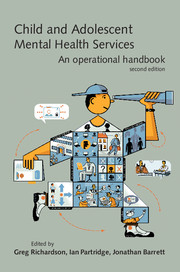Book contents
- Frontmatter
- Contents
- Tables, boxes and figures
- Contributors
- Abbreviations
- Preface
- 1 Introduction
- 2 CAMHS in context
- 3 CAMHS and the law
- 4 Structure, organisation and management of CAMHS
- 5 Evidence-based practice
- 6 Clinical governance
- 7 Education, supervision and workforce development
- 8 Multidisciplinary working
- 9 User and carer participation and advocacy
- 10 A comprehensive CAMHS
- 11 Referral management
- 12 Demand and capacity management
- 13 Strategies for working with Tier 1
- 14 Structuring and managing treatment options
- 15 CAMHS in the emergency department
- 16 Paediatric liaison
- 17 Self-harm
- 18 Learning disability services
- 19 Services for autism-spectrum disorders
- 20 Attentional problems services
- 21 Eating disorder teams
- 22 Bereavement services
- 23 CAMHS for refugees and recent immigrants
- 24 CAMHS and looked-after children
- 25 Drug and alcohol teams
- 26 Parenting risk assessment service
- 27 Court work
- 28 Tier 4 options
- 29 In-patient psychiatric care
- 30 Forensic services
- 31 Neuropsychiatry and neuropsychology services
- 32 Mental health provision for deaf children: study of a low-incidence service provision
- 33 Chief Executives – what do they want and how do they get it?
- Index
15 - CAMHS in the emergency department
Published online by Cambridge University Press: 02 January 2018
- Frontmatter
- Contents
- Tables, boxes and figures
- Contributors
- Abbreviations
- Preface
- 1 Introduction
- 2 CAMHS in context
- 3 CAMHS and the law
- 4 Structure, organisation and management of CAMHS
- 5 Evidence-based practice
- 6 Clinical governance
- 7 Education, supervision and workforce development
- 8 Multidisciplinary working
- 9 User and carer participation and advocacy
- 10 A comprehensive CAMHS
- 11 Referral management
- 12 Demand and capacity management
- 13 Strategies for working with Tier 1
- 14 Structuring and managing treatment options
- 15 CAMHS in the emergency department
- 16 Paediatric liaison
- 17 Self-harm
- 18 Learning disability services
- 19 Services for autism-spectrum disorders
- 20 Attentional problems services
- 21 Eating disorder teams
- 22 Bereavement services
- 23 CAMHS for refugees and recent immigrants
- 24 CAMHS and looked-after children
- 25 Drug and alcohol teams
- 26 Parenting risk assessment service
- 27 Court work
- 28 Tier 4 options
- 29 In-patient psychiatric care
- 30 Forensic services
- 31 Neuropsychiatry and neuropsychology services
- 32 Mental health provision for deaf children: study of a low-incidence service provision
- 33 Chief Executives – what do they want and how do they get it?
- Index
Summary
‘The chapter of accidents is the longest chapter in the book.’
John WilkesIntroduction
A UK study showed that of 107 young people with mental health problems presenting to the emergency department, a third presented following self-harm (Healy et al, 2002). Most of these cases were young girls. After specialist assessment (and brief intervention), most were not admitted for further treatment but were seen for urgent follow-up (75% within 2 weeks) in out-patients. Of the attenders who had not self-harmed, the most common problem was psychosis, including hypomania (a third of this group), followed by adjustment and other anxiety-related disorders, and problems related to intellectual difficulties. Also seen were problems related to conduct, drug and alcohol misuse, and depression (without selfharm).
Historically, perhaps because of lack of training, the American experience has been that:
‘the atmosphere towards psychiatric patients is often negative and hostile. The problems of the children and family are perceived as self inflicted, deserved outcomes that are evidence of weak, disorganised families, making poor life choice.’ (Thomas, 2003)
The NICE (National Collaborating Centre for Mental Health, 2004) guidelines on self-harm would suggest that this attitude, at least with regard to self-harm, is prevalent in UK hospitals also. There is little research on how decisions are made in the emergency department about young people with mental health problems, the different levels of tolerance in different parents and assessing professionals, the application of specific threshold criteria within care pathways, or to the negative effects of hospitalisation.
Requirements
There is a requirement in England, within the children's NSF (Department of Health, 2004) and in Scotland through the recommendations (Scottish Government, 2005) for commissioners and Local Authorities to ensure that policies and protocols for the treatment of children and young people with emergency mental health needs are developed in partnership. The level of service provided and the criteria for referral also require clarification. There is an expectation that arrangements are in place to: ensure 24-hour cover to meet children's urgent needs; that, where indicated, specialist mental health assessment is undertaken within 24 hours or the next working day; and that all staff likely to be called upon to carry out the initial social and mental health assessment receive specific training. On-call and 24-hour specialist CAMHS are not yet provided in many areas.
- Type
- Chapter
- Information
- Child and Adolescent Mental Health ServicesAn Operational Handbook, pp. 138 - 150Publisher: Royal College of PsychiatristsPrint publication year: 2010

